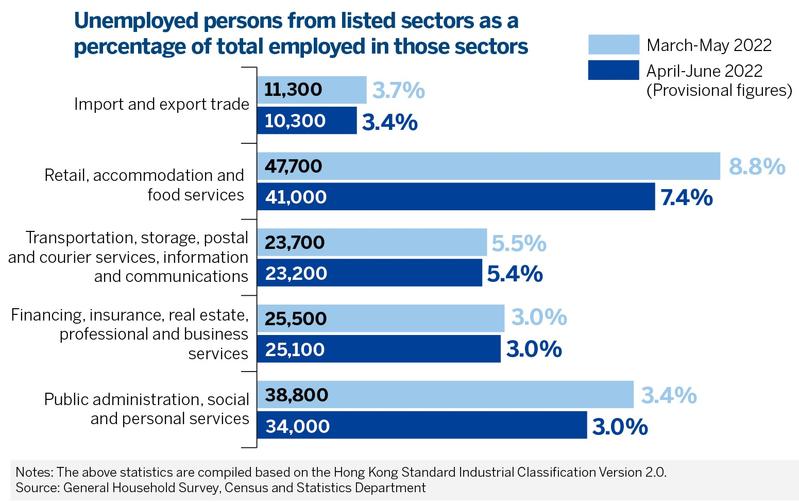Back in the hiring line

Hong Kong hotels, retailers and restaurants are taking the lead in reviving the local job market following the chill caused by the pandemic. Experts see light at the end of the tunnel, with the local unemployment rate likely to dip further by year-end. Liu Yifan reports from Hong Kong.

Half a day had passed at a Hong Kong job fair held in mid-July when Royal Plaza Hotel - a five-star hotel in Mong Kok - received up to 20 job applications, but it was still way short of its target.
"We plan to hire more than 80 workers to fill vacancies as more people, with limited chances of overseas travel amid the pandemic, take staycations and dine out locally," said Karen Tam, a recruitment officer at the hotel.
The hotel has found itself short of employees in various departments, including engineering, housekeeping, the front office, food and beverage, and security.
Hong Kong has never seen demand for labor so strong since the fifth wave of the coronavirus outbreak struck, which wreaked havoc on nearly all key sectors of the economy.
But the city may now be seeing light at the end of the tunnel, following the chill in the consumption market.
Human resources officers like Tam are putting "hiring" back on top of their to-do lists, as the monthly number of jobs up for grabs in the private sector exceeded 90,620 in the three months from April to June - a jump of almost 20 percent from the average figure in the preceding three months ending in May.
Hong Kong's seasonally adjusted unemployment rate dropped 0.4 percentage point to 4.7 percent between April and June, with the number of employed people having risen by around 17,800 from the three months ending May. The underemployment rate slipped 0.5 percentage point to 3 percent - the lowest level since February.
"The labor market is one of the bright spots in the economic recovery process," said Terence Chong Tai-leung, an associate professor at the Chinese University of Hong Kong's economics department.

Govt measures offer impetus
The demand for workers swelled in lockstep with the HKSAR government's various support programs, with the overall economy pointing to a rebound from the pandemic doldrums since the start of the second quarter. This is evident from an 11.7-percent year-on-year increase in April's retail sales, fueled by this year's first-phase handout of HK$5,000 ($637) electronic consumption vouchers to more than 6.3 million eligible residents.
In addition, the 2022 Employment Support Scheme approved about HK$10 billion in wage subsidies in May to more than 1.2 million employees from 152,000 employers.
Backed by stimulus and relief programs, employers have snapped up workers across most industries, particularly in the consumption-led and tourism-related sectors. Food-and-beverage companies saw an increase of 4,400 in the number of people hired in the second quarter, according to the Census and Statistics Department.
The construction sector also did well, adding 2,000 jobs, while arts, entertainment and recreation saw the number of people jobless in their fields cut by 1,100.
"Firms have been waiting for a long time to raise their head counts, and layoffs should remain low with rising job vacancies," said Andy Kwan Cheuk-chiu, director of the ACE Centre for Business and Economic Research. "Despite lingering threats from the pandemic, there're no signs the labor market will cool down yet," he said.
Chong said he expects the local jobless rate to dip below 4 percent by year-end, reaching a near low amid the pandemic.
Secretary for Labor and Welfare Chris Sun Yuk-han is confident that the labor market will improve further in the near term as city's economic activities continue to pick up. But the degree of improvement will depend on the local pandemic situation, as well as the financial environment in Hong Kong and worldwide.
He said various supportive measures rolled out by the SAR government so far will continue to support the recovery of the local economy.
The second phase of electronic consumption vouchers this year, will start distributing on Sunday, with relaxed criteria for certain appliants. The SAR government in March estimated the two-phase handouts would boost economic growth by 1.2 percent. Meanwhile, the 2022 Employment Support Scheme under the Anti-epidemic Fund was in place from May to July, helping employers retain their workers or hire more employees when their businesses revive.
Hailing the government's unfaltering efforts to stabilize employment, Lawrence Hung Yu-yun, president of the Hong Kong Institute of Human Resource Management, said he sees a steady economic recovery that will boost labor demand across different business sectors, including catering, and create new job opportunities in technology and building sectors.
"It's reasonable to believe that when the pandemic eases, the improvement in the labor market would be broad-based," said Hung. "Businesses that have been hard-hit by the outbreak, such as retail and catering, would probably show a greater extent of revival in the near term."
Kwan, however, warns that employment in externally oriented industries will remain uncertain against the backdrop of a global recession. Hopefully, the recent revival of economic activities on the Chinese mainland and the gradual resumption of cross-border land transportation will give trading activities a shot in the arm in the second half. But potential risks posed by the worsening global economic outlook are very real, he said. "We'll probably continue to see a volatile import-and-export performance, which may, in turn, hinder the sector's hiring plans."
Looking ahead, Hong Kong's labor needs will keep evolving in tandem with the restructuring and development of "a tech-driven and knowledge-based economy", said Lancy Chui Yuk-shan, a senior vice-president at ManpowerGroup Greater China.
In her view, technically talented people will be the pick of the crop in the job market as digital transformation gains prominence on the corporate scene. Hong Kong's aim to become a global innovation and technology hub is clear, and this will forge a vibrant landscape favorable to the development of technological applications.
"Tremendous job opportunities will be brought to Hong Kong by the promising outlook of innovations, including smart transportation, remote working and financial technology," Chui said.

Manpower shortage looms
The overall picture should look rosy for the SAR's labor sector despite challenges posed by a shrinking workforce. The size of the city's labor force, at about 3.75 million recorded in the second quarter this year, was over 6 percent less than the nearly 4 million people who were working or seeking jobs before the pandemic.
One major obstacle is the aging population, which is expected to pose a drag on the local workforce in the years to come. According to the Census and Statistics Department, the number of elderly people, aged 65 and above, is predicted to rise from 20 percent of the city's total population last year to 33.3 percent by 2039.
"Other short-term pandemic-related hindrances, such as disruptions to cross-border flow of people, or workers opting to quit the labor market temporarily, are also relevant," Kwan said.
Economists and human resource experts have called for further measures to be taken to help more people join the workforce and enhance the quality of workers, such as promoting training and retraining, and providing more child-care services.
Kwan stressed that stabilizing the overall employment environment is not just a matter of focusing on the workforce already in place, but of retaining and enticing nonlocal experts to fill market needs.
Policies to facilitate people mobility and attract those with good education and expertise should be further implemented, Kwan said. "The main thing now is to substitute those people who have left the economy," he said, adding that the mainland could become a rich source of professionals for Hong Kong amid the deepening economic and social links between the two sides.
"Hong Kong does have the vision to tackle dwindling labor supply. But, moving in that direction, you need a road map, and it has to start with introducing more resources and letting people from outside to see the prospects here," he said. "This is the thing of the future, and the thing to do right now."
- CPC expels former head of insurance company
- Canton Fair records rise in overseas buyers
- Hainan lauded by head of World Free Zones Organization
- Unlocking Shanghai's next wave: Capital, data and talent in flow
- Visually impaired runners enjoy outdoor running in Shanghai
- Xi's discourses on work related to women, children, families published in more foreign languages





































